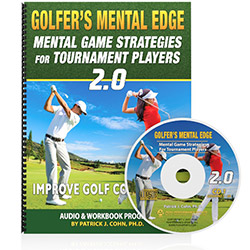Golfers Who Choke Because of Fear
How many times has fear ruined a round of golf for you?
Have you ever been overwhelmed by thoughts such as:
- “I’m afraid of missing this putt.”
- “I’m afraid of shooting bad round.”
- “I’m afraid of losing the lead.”
- “I’m afraid my short game will be horrible just as it has been in practice.”
- “I’m afraid my coach will be mad at me if I keep playing poorly.”
- “I’m afraid of chocking.”
Fear is the biggest obstacle to peak performance… Fear leads to worry and worry leads to playing it safe…
Unfortunately, “play it safe” option is really no option at all if you want to play your best golf.
To illustrate this point, let’s examine the case of Jen W., a sophomore collegiate golfer…
Jen W. is the top golfer on her team and ranks just outside the Top-10 in her conference.
Jen W. has the talent to crack into the Top-10 but in tough matches, she gets over-anxious and misses easy shots that she would normally make.
Jen becomes so tight that she consistently leaves putts short.
Jen fears she will not live up to her potential and she is afraid of letting her coach down. These fears eat at her.
Jen realizes her fears are keeping her from her potential and knows she needs to do something in order to regain her confidence and play at her peak under pressure.
Many golfers experience similar fear when playing but elite golfers do something about their fears in order to play at their best.
Albane Valenzuela, the No. 3-ranked amateur player in the world, admits that fear has held her back in the past, especially in match play.
Valenzuela, who played in the final of the 117th U.S. Women’s Amateur Championship, said she is trying to focus on her game instead of giving into fear.
VALENZUELA: “Sometimes I would approach [match play] with some fear, but I now realize that fear doesn’t bring you anything. The best defense is to attack, so that’s what I keep telling myself.”
The way to alleviate fear and anxiety is to go for your shots instead of choosing to play it safe. That’s correct, playing aggressively trumps fear and allows you to focus on your game rather than worrying about outcomes.
There is a classic book, “Feel the Fear and Do It Anyway,” that espouses the virtues of pushing past fear. Each time you act in the face of fear, you make it easier to do it the next time and you build a strong habit for the future.
Overcoming Fear During a Round of Golf:
Follow Valenzuela’s lead and make the conscious choice to go for your shots instead of allowing fear to win out.
Use a cue word or words, such as, “Be aggressive,” “Attack,” or, “Go for it,” to remind yourself to stay aggressive.
When you find your mind wandering to the land of ‘What If,’ use your cue words to bring you back to what you need to do at that moment.
“Feel the fear and do it anyway.” And learn how to play composed and confident golf with “The Golfer’s Mental Edge.”
Golfer’s Mental Edge

What’s the big sign that your mental game is the weak link in your golf game? When you can’t play consistently as well as when you play a practice or casual round–or your range game is way better than your game on the course. If you suffer from lack of focus, low self-confidence, poor composure or other mental game obstacles on the course, you can’t reach your true potential in golf.
The Golfer’s Mental Edge 2.0 Audio and Workbook program is ideal for any amateur, collegiate, junior, and tour professional golfer.
Golf coaches and instructors would also be wise to teach “The Golfer’s Mental Edge 2.0” principles to their players. This program is perfect for any golfer who wants to improve performance and consistency by managing their mind better on the course.

